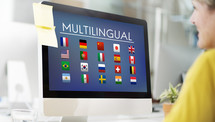Types of Translation
Given the ever-shrinking world we live in and the international nature of business and e-commerce, professional translation services have changed dramatically. There has been, for example, an explosion of online translation services that eliminates the need for individuals and business professionals to find local translators, screen and interview them, and then determine if they have the expertise and skillset to complete the types of translations they need. Instead, they can contact online translation services that have a vast array of translators who have specializations and experience in those specializations.
The following divisions of translation into categories will give you an idea of the different types of translation that are provided by these professional services and what levels of complexity and expertise might be required.
-
Basic or General Translation
These are types of translation that do not require absolute accuracy and that give the translation a lot of flexibility. The source text is usually non-technical and in simpler vocabulary. The simplicity makes the translator’s work much easier, as it is easy to translate vocabulary, phrases, and sentences. Examples of these types of translation would include letters, relatively simple business pieces, such as employee manuals, and a lot of website content and blog posts.
-
Legal Translation
This is a far more complex type of translation, for it requires a deep knowledge and understanding of legal terms in both a native language and the target language. Most translators who work in legal specialization have a legal background themselves – it’s just necessary because of the absolute need for accuracy and correct terminology. One slip or mistake can alter the terms of a treaty, an international contract, or an agreement between a company and foreign workers. Legal translation require human, not machine, translation, and a professional translation service will only use humans for these types of translations.
-
Medical, Scientific Research Articles
This is another area that calls for lots of specialization and human, rather than machine, translation. Terminology is complex in these areas, and translators who have or have been trained in such terminology. Today, medical and scientific research has a global reach and studies are translated in a wide variety of languages, so that scientists can collaborate.
Useful information: Make your global reach with the assistance of the best German translation services provided by native experts.
-
Localization
This type of translation is used by e-commerce businesses who want their websites and apps localized for target audiences. If it is only text that is being translated, much of this falls into the category of basic or general translation. However, when there are concerns with coding, obviously, a developer must be used. The other issue with localization is the cultural and societal customs of the target audience, and translation requires honoring those. Many businesses have made mistakes with literal translations that have gone wrong. Some of the types of translation services for businesses in English as the source language can offend target language audiences or cause big mis-understandings. KFC discovered this when the English term “finger-lickin’ good” was literally translated into Chinese as, “lick your fingers off.”
Read also: Why you should consider hiring professional Arabic translation services to assist you with documents?
-
Commercial/Financial Translations
Many of these will fall into other categories, specifically basic and legal. Depending on the documents, translators of all different levels of expertise will be required. There may be reports, correspondence, managerial and employee content/manuals, policies and procedures, and more. Many will require expert translation to prevent mis-understandings.
Useful information: Where can you find the most affordable translation price per word?
-
Literary Translation
While many people think of this as a simple type of translation – novels, poetry and such – in fact it is quite difficult. Consider a book written in English. It has idioms, expressions, humor, sarcasm and other figurative language that cannot be literally translated into another language. Experts in both languages will need to understand the linguistic nuances of the target language, so that the same meaning and connotations are transferred to the target audience readers.
Read also: Pitfalls of localization you should avoid as a marketer.
Human vs. Machine
Today, there are numerous pieces of software that provide translations digitally. Unfortunately, they are not refined enough to make scientific, legal, literary translation, technical translation services accurate. They can be used for basic, simple translations, however, and a number of freelance translators earn extra money using such programs/apps for these types. Most professional services, however, shun machine translation without at least a human to review and edit them. And, of course, a reputable service will use human/manual translation for anything beyond the basic.













